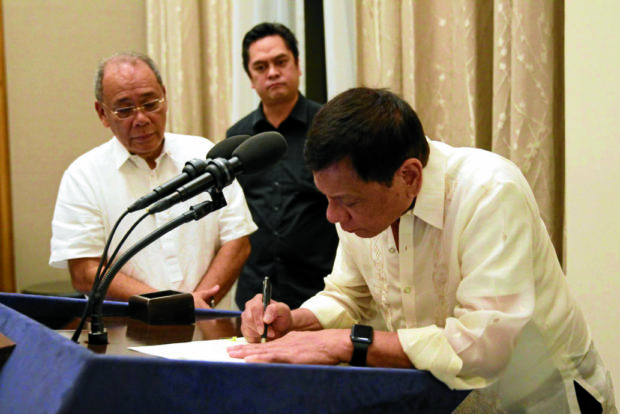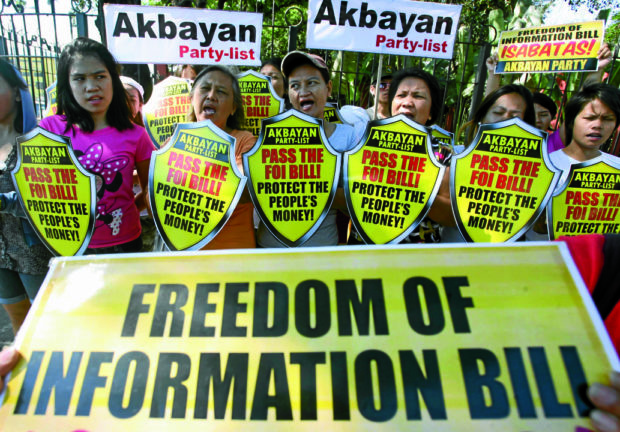Duterte’s FOI order leads to ‘unintended consequences’

TRANSPARENCY POLICY President Duterte signs an executive order laying down his administration’s policy of full public disclosure and transparency in public service, but it does not cover the legislature, judiciary and even local governments. —MALACAÑANG PHOTO
President Rodrigo Duterte’s issuance of an executive order on freedom of information (FOI) was a much-lauded move and a step in the right direction, but it has had “unintended consequences” that have not always led to greater transparency.
Executive Order No. 2, signed on July 23, 2016, and implemented for about seven months now, has laid down a policy of full public disclosure and transparency in public service to promote accountability, and sets the guidelines for requesting and releasing information from offices under the executive branch.
Subsequent issuances laid down exceptions to transparency and the administrative penalties for government officers who would not abide by these.
Congress, LGUs not covered
The executive order (EO) does not cover the legislature, judiciary and even local government units (LGUs), though it encourages them to observe the order.
Assistant Presidential Communications Secretary Kris Ablan, who oversees the implementation of the FOI policy, said it had been a success so far despite some bumps along the way, including the fact that a little over half of requests sent through the electronic portal were rejected.
Many of the requests were denied not because people asked for confidential information that fell under the exceptions to transparency, but because they asked the wrong government agency for the data, Ablan said.
He said successful requests from students, professionals and government employees attested to the usefulness of the FOI program.
Info under wraps, delays
But in an interview with the Inquirer, Ablan acknowledged that the FOI executive policy had “unintended consequences” that led to information being kept under wraps or taking longer to be released as it passed through the bureaucracy.
These would be addressed as the Presidential Communications Operations Office (PCOO) irons out the kinks in the program, he said.
Ironically, in some cases, government agencies had released information more readily before the EO on FOI took effect.
BOI case
Ablan cited the case of the Board of Investments (BOI). Before the EO, the agency had been providing certain data, even to foreigners who could be potential investors.
After the FOI policy was put in place, the BOI wondered if it could still disclose information since the FOI was only for Filipino citizens.
“We had to tell them, hey, we can’t use the FOI to go one step forward and then two steps backward. If you already disclosed information in the past to foreigners and you disclosed it to them because they might invest in the Philippines, continue disclosing it,” he said.
The FOI is a tool, not a reason to withhold information, he stressed.
Ablan also noted that the release of information had not always been as quick as it could be under the FOI.
15 working days
The EO on FOI provides for 15 working days within which government offices must respond to a request. In many cases, the offices use up the 15 days before issuing a response.
They don’t have to do this and should release the data as soon as possible, Ablan said. He pointed to the example of the Career Executive Service Board, which promised to release information in seven days.
Malacañang may release a memorandum circular reminding government offices that they don’t have to take all of 15 days to act, he said.
There have also been concerns that with the FOI, government offices are no longer proactive in releasing information and are just reacting to requests.
During the Aquino administration, Malacañang had readily disclosed the costs of the President’s overseas trips right from the start. Requests for statements of assets, liabilities and net worth (SALNs) of Cabinet officials had also been granted days after the April 30 deadline for filing these.
But the case has been different in the Duterte administration.
Pending SALN requests
The Malacañang Press Corps has a pending request at the Office of the President for the Cabinet secretaries’ latest SALNs. As of mid-June, or more than a month after it was filed, the request has yet to be granted.

CALL FOR ACTION Activists have been demanding government transparency and full public disclosure through the passage of the freedom of information bill. —INQUIRER PHOTO
In a June 1 letter, the Malacañang Records Office said the SALNs were still undergoing a “review process” under the review and compliance procedures of the SALN, disclosure of business interests and financial connections, and identification and disclosure of relatives. This is pursuant to Section 10 of the Code of Conduct and Ethical Standards for Public Officials and Employees, it said.
But the same law states that all statements filed under it, which includes SALNs, “shall be made available for copying or reproduction after 10 working days from the time they are filed as required by law.”
President’s trips overseas
Malacañang also disclosed the costs of President Duterte’s 2016 overseas trips only in February this year, despite earlier queries from the media. Not long after, it granted media requests for the costs.
An Inquirer FOI request for the costs of all of the President’s trips up to May 2017 is still pending.
Ablan was asked why Malacañang didn’t just release these data on its own initiative in the name of transparency, even without an FOI request, especially since he himself noted that these were the subjects of frequent inquiries through the eFOI portal.
He said the PCOO was trying to continue the “open data” program started by the Aquino administration that provided for “proactive disclosure” of information even without requests.
“We need to remind them that FOI is not just ask then answer, but proactive disclosure. We at the PCOO are advocating proactive disclosure. We’re telling them, you disclose it already like you did in the past because it lessens the workload,” he said.
This will take some time, though he is optimistic that this is the direction where the practice is heading.
Data privacy act
“Some of the agencies are seeing the logic of just disclosing the information immediately so that there would be no need to strain the front lines,” Ablan said.
In some instances, government agencies are wary of violating the data privacy act or disclosing incorrect information or because they could face administrative liabilities, the harshest being dismissal from government service, he said.
“They have this fear now that they will be liable. I think that’s the difference before, there was no liability,” he said.
Raymond Liboro, head of the National Privacy Commission, said the data privacy act did not necessarily clash with the FOI policy.
There is no absolute right and the data privacy act is mainly intended to protect personal information, Liboro said in a recent FOI forum sponsored by the PCOO.
Since the FOI policy was just based on an EO and not a law, agencies could add to the exceptions that the Palace had laid down if they think there was a basis for this, Ablan said.
He said concerns about too many exceptions to the FOI were among the challenges that the PCOO was facing. Another was the penalties for violating the EO, which were considered too light.
Manuals, eFOI portal
As of June 15, 151 out of 222 national government agencies, including all 22 departments, had come up with their own FOI manuals, which the PCOO had asked them to do because the processes and the needs of each office are different.
Not all of them have joined the eFOI portal that allows citizens to file request for information online. Ablan said the PCOO was hoping to include all departments by November.
The top five agencies with the most number of requests through the eFOI portal are the Philippine Statistics Authority, Department of Health, Department of Budget and Management, Department of Transportation and PCOO.
Sharing information is much easier and more efficient through the online portal. Under the manual system, if a person makes a request, he or she is the only one who sees the data.
But under the eFOI system, the agency can post the requested information online so that others may view this as well. This will spare the agency from answering similar requests repeatedly, he said.
Despite some challenges in its implementation, the EO on FOI has helped level the playing field and empowered citizens by providing them the information that they want and need, said Ablan.
Before, those who need to get data from government offices would have to rely on knowing someone on the inside, this time any citizen could make a request and be assured of a response, he said.
Student Franz Zulueta
One of cases Ablan cited was that of student Franz Zulueta, who wanted to do an accountability check. Zulueta requested and received a copy of the concession agreement between the Light Rail Transit Authority and the Light Rail Manila Corp. for the LRT 1 project.
The successful request showed that the FOI was not just for journalists and researchers, but for all Filipinos, including ordinary ones, Ablan said.
But even with these gains from the landmark program, Ablan said greater success would be achieved if an FOI law was in place.
The PCOO is joining transparency advocates in urging Congress to approve the bill to put the FOI in place.
When Mr. Duterte signed the EO on FOI, the Palace had expected that Congress would follow suit and pass the draft law.
Ablan said the PCOO was working with the Office of the President for its FOI program to be mentioned in Mr. Duterte’s second State of the Nation Address in July to spur Congress to work on the counterpart bill.
“All of us want the FOI program to succeed. In order to have a real effective FOI, it has to include everyone,” he said.














